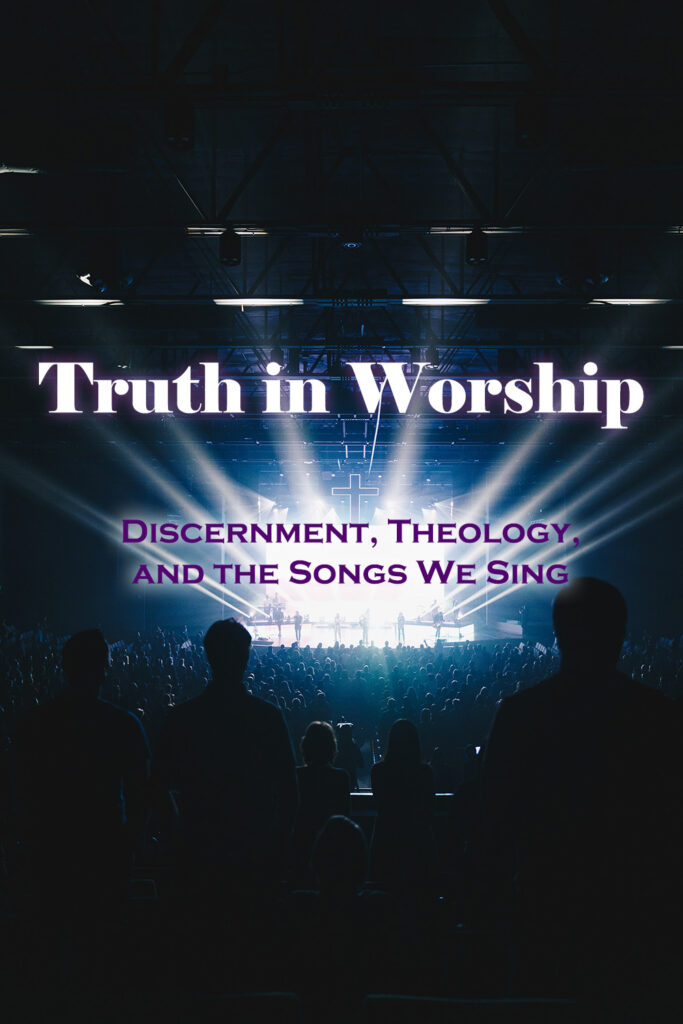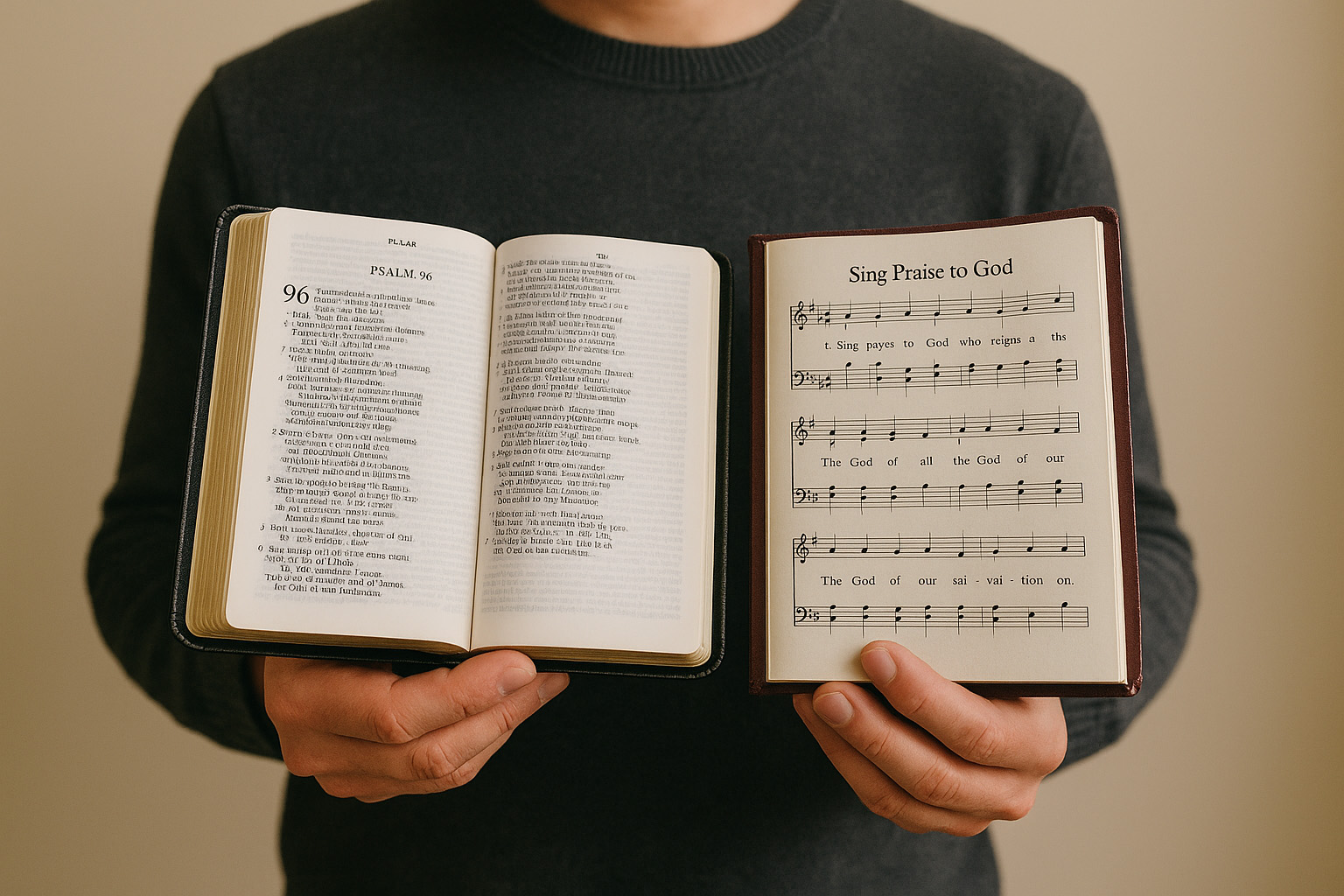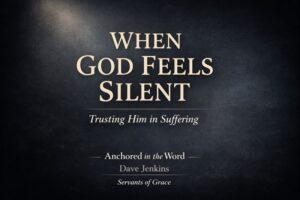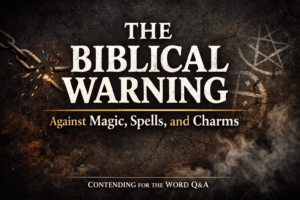⏱️ Estimated Reading Time: 7 min read
How and Why Christians Can Exercise Discernment in the Songs They Sing
By Dave Jenkins
Christian worship isn’t merely about melodies—it’s about theology. Every lyric we sing teaches something about who God is, what He has done, and how we are to respond. In a culture saturated with catchy tunes but shallow doctrine, Christians must rediscover the importance of discernment in their worship.
Worship through music is not entertainment, it’s an offering. And what we offer to the Lord must be marked by truth, reverence, and biblical fidelity (John 4:24). So, how can Christians rightly discern what they sing, and why does it matter?
Biblical Worship Requires Biblical Truth
God has not left us to invent worship on our own terms. Scripture defines what true worship looks like— centered on God’s character, shaped by His Word, and directed toward His glory. Colossians 3:16 exhorts, “Let the word of Christ dwell in you richly… singing psalms and hymns and spiritual songs, with thankfulness in your hearts to God.” Songs are a vehicle for teaching. If the lyrics are shallow, vague, or false, they do more harm than good. To sing rightly, Christians must evaluate lyrics for:
- Doctrinal clarity: Does the song rightly reflect the truths of Scripture?
- Christ-centered focus: Does it exalt Jesus, or merely stir emotion?
- Biblical language: Are the lyrics shaped by the vocabulary of Scripture?
Worship Has the Ability to Shape Doctrine
What we sing, we remember. Music is one of the most powerful tools for catechizing believers, especially children and new Christians. When songs emphasize emotionalism without truth, they train our hearts to pursue feelings over faithfulness. When songs are rich with biblical themes—grace, atonement, holiness, and the cross—they equip the church to stand strong in a world of confusion. Churches must ask: are we discipling our people through what they sing?
Discernment is a Mark of Spiritual Maturity
Discernment isn’t a “nice-to-have”—it’s a spiritual necessity. Hebrews 5:14 reminds us, “But solid food is for the mature, for those who have their powers of discernment trained by constant practice…” In an age when some churches use music as bait to attract crowds, we must ask deeper questions:
- Where does this song come from?
- What does it say about God, sin, salvation, and the Church?
- What does it produce in the hearts and minds of worshippers?
Discernment protects both the worshipper and the congregation from error, and helps ensure that we are not sincerely wrong in how we praise the Lord. Pastors and worship leaders have a responsibility to help their congregations grow in musical discernment. One of the most loving things a shepherd can do is filter the worship set through the lens of Scripture, not just musical appeal.
Worship That Honors God Must Reflect His Holiness
Worship is about God, not us. We must guard against a consumer mindset that judges songs based on how they make us feel rather than how they glorify the Lord. Hebrews 12:28 encourages, “Therefore let us be grateful for receiving a kingdom that cannot be shaken, and thus let us offer to God acceptable worship, with reverence and awe…” This means being cautious about songs:
- That overemphasize human emotion while minimizing God’s attributes.
- That originate from ministries or movements with serious doctrinal compromise.
- That treat Jesus as little more than a boyfriend or reduce the Trinity to a vague “presence.”
God is holy; He is not to be approached casually or carelessly. Worship that is theologically shallow, irreverent, or emotionally manipulative dishonors the One we are meant to glorify.
Church History Can Help Us Build Wisely
The Church has centuries of hymnody that reflects deep theology. We do not need to start from scratch. Hymns by Isaac Watts, John Newton, William Cowper, and more recent examples by the Sovereign Grace Music, offer biblically-rich resources for the Church today. When we endeavor to select songs for our worship services, we must ask:
- Are we including songs that have stood the test of time?
- Are we grounding our new songs in the deep wells of theological tradition?
- Are we helping the next generation inherit a legacy of worship rooted in truth?
There is wisdom in drawing from what has endured. Let the past guide the present as we sing with the saints across the ages.
Evaluating the Source Matters (But Requires Nuance)
A key question in today’s debate is: Should we sing songs from ministries or churches that teach false doctrine? This includes sources like Bethel, Hillsong, and Elevation. While not all songs from such movements are heretical in themselves, using them unfortunately may:
- Lend unintentional credibility to dangerous theology.
- Create confusion among the flock.
- Expose churches to spiritual compromise.
Historically, the Church has exercised caution about using materials produced by heretical movements, even if some of the content sounded biblical. Why? Because worship is not just about lyrics; it’s about witness. Moreover, royalties from streaming and CCLI usage often go back to these ministries, funding their teaching platforms. This is more than a musical decision—it’s a stewardship issue.
Discernment here isn’t about being divisive, it’s about being faithful. Local church leaders should equip their congregations to understand both what they sing and why.
Shepherding Worship Teams with Discernment
Pastors and worship leaders are responsible not just for musical quality, but for doctrinal fidelity. As such, they must:
- Encourage teams to read and reflect on lyrics before rehearsing.
- Provide doctrinal review of songs before introducing them.
- Disciple worship leaders to love theology as much as melody.
- Sing songs that honor the Lord of the Word, not just the mood of the moment.
How to Respond to Common Objections
Unfortunately, making these types of decisions can often be met with push-back from the congregation. And while some of their questions may be legitimate, the ones below are not valid reasons to cave to popular demand.
- “Isn’t it legalistic to scrutinize every song?” It’s biblical (1 John 4:1; Acts 17:11). Discernment is not about nitpicking—it’s about protecting the flock and offering worship that honors Christ.
- “What if a song has great lyrics but comes from a bad source?” Even if a song is doctrinally sound, singing it may still platform problematic ministries. Churches must weigh whether or not the benefit outweighs the risk and explain their choices with care.
- “Aren’t all songs imperfect?” Yes, but that doesn’t mean we should settle for theologically-weak or misleading songs. Strive for songs that are both musically beautiful and theologically faithful.
Conclusion: Worship is a Discipleship Issue
The songs we sing don’t just reflect our theology, they shape it. That’s why biblical discernment in worship isn’t optional. It’s a call to worship God with reverence, truth, and joy, rooted in His Word. Let’s raise a generation that doesn’t just sing loud, but sings true.
Pastors, don’t hand over the theological direction of your church to a Spotify playlist. Let our worship be bold with truth, rich with Scripture, and aflame with awe. For our God is holy, and He is worthy. Ask before you sing:
- Does this song exalt the triune God?
- Is it faithful to Scripture?
- Would I still sing it if the music were stripped away?
- Does it teach sound doctrine?
- Does it stir affection because of truth, not instead of it?




